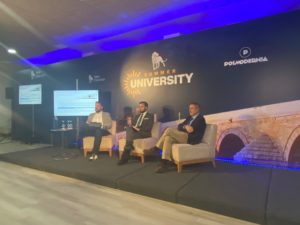The political analyst, Ruben Pulido has been in charge of bringing the x-ray of immigration to Europe. After the presentation, Matías Recio has exposed the legislative modifications for immigration control and protection of our borders.
For his part, Rubén Pulido has reviewed the political decisions that have influenced the increase in illegal immigration in Europe, showing, first of all, how the illegal immigration routes work in the central Mediterranean and how the work of NGOs and maritime rescue in the rescue of vessels that illegally try to access Europe. "Maritime legislation is breached, the monitoring of these vessels shows that, instead of Maritime Salvage taking them to the nearest port, a safe port, they end up in European ports."
This trend changed in 2018, according to Pulido “with the arrival in Italy of the migration policies of Matteo Salvini. It carries out a harsh policy against humanitarian organizations and despite the hunt that was exercised in this regard against Salvini, it should be noted that the application of these migratory policies lowered the number of deaths and drownings in the central Mediterranean.”
A greater presence of NGOs creates an attraction factor. In 2018 it goes from those 119,000 illegal immigrants to 23,000 and there we see the decrease in the deceased. Salvini's porti chiusi campaign exponentially curbed the number of illegal arrivals in Italy and criminal activity on Libyan shores. In fact, in May 2017, 65 deaths were registered, while in 2018 only 1.
The contrast to this panorama is Spain. “When Salvini came into power, so did Pedro Sánchez in Spain. While the Italian leader blocked the entrance of the Aquarius, Sánchez made the political decision to open his hands to all those immigrants that Salvini denied entry to Italy”, explained Pulido.
“The naval containment in Italian territory causes illegal immigration to decrease and increase in Spain. In the same year, in October, a thousand illegal immigrants entered Italy while in Spain there were almost 12,000, there we contrast the way of carrying out some immigration policies or others”.
Regarding data, Rubén Pulido explained that 2018 was a record year in terms of illegal immigration. "The political decisions mean that more than 65,000 illegal immigrants enter Spain, some may say that in 2018 there was co-governance, but the truth is that more than 80 percent in 2018 entered with Sánchez in power and more than 70 percent in the last 10 years agree with Sánchez in Moncloa”.
Pulido has warned that the work of NGOs and Salvamento Marítimo represent a very significant attraction factor. During the presentation, he showed how Humanitarian Organizations act and how Salvamento acts when it rescues a boat. "They act beyond what is established by law, those rescued are taken to Spanish ports when the closest one is usually a sub-Saharan port, they are safe, they do not endanger people's lives."
Pulido ended by explaining that "political decisions bring some consequences or others. The number of illegal immigration routes that are being activated while the reduced number of operations fails to intercept all these vessels and, therefore, not a considerable number of jihadists who use this modus operandi to enter Spain, as may be the case of Abdel Bari.
“All this is predictable and I have managed to foresee it, when there is a massive assault on the fences. If I can foresee the assault on the fence, the government can too, and if the government has not done anything, in some way it is because it is not convenient for them.”

For its part, Matías Recio has proposed an interesting comprehensive legislative reform on immigration matters and its necessary application. He strongly explained the challenges we face in terms of migration, the demographic challenge, the security challenge and the economic challenge.
“The objectives of this legislative proposal are zero tolerance for illegal immigration, guarantee security for the host society, integration into the national community of the new migrant population. Faced with the globalist agenda, we must reaffirm the power of nation-states to establish their own immigration policy, adapting migratory flows to their needs and reception capacity”, Recio added that “we have to claim national sovereignty as an essential framework of the rule of law”.
With regard to the reform, he explained the great axes which must include the same, such as the review of the acquisition of Spanish nationality of origin by ius solis in certain cases, the acquisition by continuous residence, extending the times to encourage rooting, requiring adequate knowledge of our system for its granting values, legal system, history and culture, in addition to command of Spanish. And lastly, the loss of the acquired nationality in case of conviction for the commission of terrorism crimes or commission of crimes punishable by custodial sentences of more than 10 years.
Regarding the granting of residence and stay permits to foreigners, Recio explained that “it is necessary to extend the regulated hot returns for the borders of Ceuta and Melilla to the Spanish jurisdictions. As well as applying the return procedure without the need for an expulsion file to foreigners who remain illegally in Spain", in addition "it is important that any type of residence be denied to those foreigners who have entered Spain illegally, among other measures".
The book of Matías Recio, Comprehensive Immigration Reform, opinion on the preparation of a draft organic law for comprehensive reform in immigration matters, to publicize all the measures proposed for the aforementioned reform.
